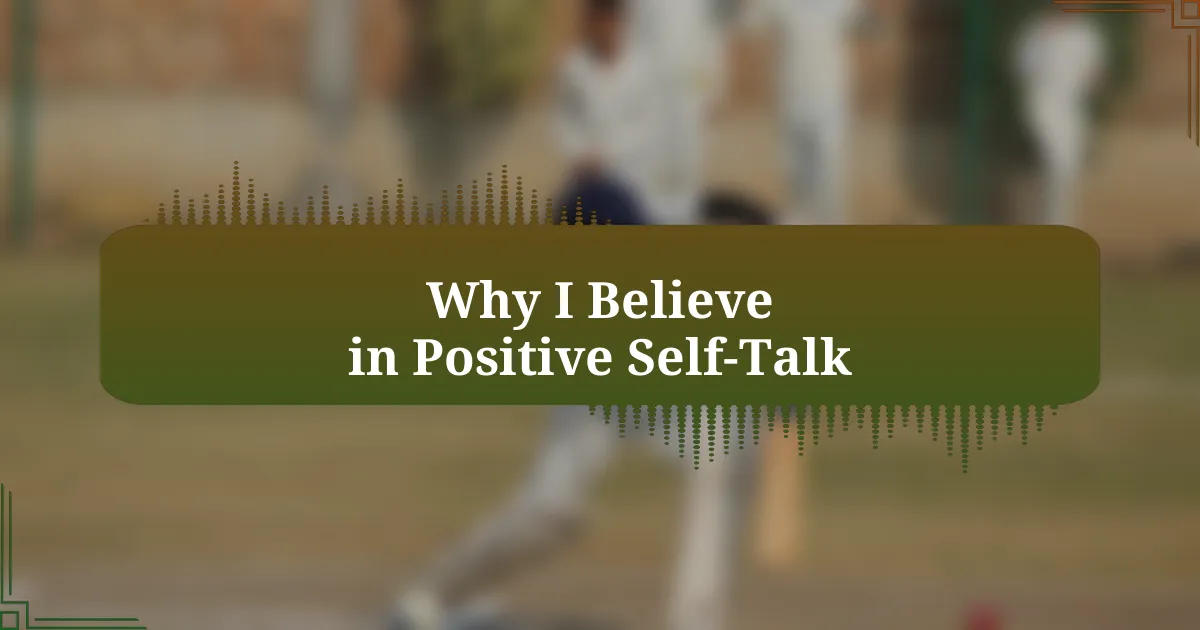Key takeaways:
- Positive self-talk can transform mindset and performance in sports, shifting focus from anxiety to confidence and improvement.
- Encouraging self-talk fosters resilience, helping athletes bounce back from mistakes and setbacks during competitions.
- Visualization and affirmations enhance the effectiveness of self-talk, boosting confidence and aligning mental focus for peak performance.
- Consistent integration of positive self-talk into practice sessions promotes a positive learning environment, making challenges feel manageable.
Author: Evelyn Harper
Bio: Evelyn Harper is an award-winning author known for her evocative storytelling and rich character development. With a background in psychology, she weaves intricate narratives that explore the complexities of human relationships. Her debut novel, “Whispers in the Wind,” received critical acclaim and established her as a fresh voice in contemporary fiction. A graduate of the Iowa Writers’ Workshop, Evelyn resides in Portland, Oregon, where she continues to write and inspire aspiring authors through workshops and mentorship. When not immersed in her writing, she enjoys hiking the Pacific Northwest trails and sipping coffee at local cafes.
Understanding positive self-talk
Positive self-talk is the inner dialogue that can uplift or hinder us, depending on what we choose to focus on. I remember standing at the crease, nervous before facing a tough bowler. That inner voice could either amplify my anxiety or remind me of my training and ability. Isn’t it fascinating how the words we say to ourselves can shape our performance?
When I shifted my mindset to embrace positive self-talk, I noticed an incredible transformation in my game. Instead of berating myself for a missed catch, I started saying, “Mistakes are part of learning.” This simple phrase helped me focus on improvement rather than dwelling on failures. Have you ever considered how just a few words can shift your entire mindset?
Understanding the concept of positive self-talk involves recognizing its power and potential. It encourages an optimistic view of both successes and setbacks. The real challenge lies in making consistent efforts to cultivate this habit, especially on tough match days. How could changing just a few words make such a significant difference? It’s all about building a supportive inner environment that propels us forward.
Importance of self-talk in sports
The role of self-talk in sports cannot be overstated. I’ve seen firsthand how a few encouraging words can shift my mindset just before stepping onto the field. Take those moments right before a crucial delivery; reminding myself, “You’ve got this,” gives me a surge of confidence that directly impacts my performance. Have you ever felt that surge of belief when you change your internal narrative?
In team settings, the impact of positive self-talk extends beyond individual performance. I recall a time when our team was lagging behind in a championship match. Instead of letting frustration seep in, I suggested we focus on motivating each other. By sharing affirmations and somewhat playful banter, we drastically changed the team’s energy. Isn’t it amazing how a collective shift in mindset can rally everyone’s spirits?
Self-talk becomes even more vital during high-pressure situations. I often find myself reflecting on this during tight matches. When the game is on the line, my inner dialogue transitions from self-doubt to resolute phrases like, “Stay calm and stick to the plan.” This ability to control my thoughts not only steadies my nerves but also enhances my decision-making. Have you recognized this kind of inner dialogue in your own moments of pressure?
Benefits of positive self-talk
The benefits of positive self-talk can’t be underestimated, especially in the world of amateur cricket. I remember a day during practice when my batting seemed off. Instead of getting frustrated, I began repeating, “Every shot is a learning experience.” This shift allowed me to focus on improvement rather than mistakes, which transformed not just my mindset, but my entire performance throughout the session.
Moreover, positive self-talk fosters resilience. I faced a match where I dropped a simple catch that almost cost us the game. In that moment, negative thoughts rushed in, but I fought them back by affirming, “Mistakes are part of the game; you’ll get another chance.” That mindset reset helped me stay engaged and ultimately made a significant catch later on. Doesn’t it make a difference when we encourage ourselves to bounce back?
Additionally, employing positive self-talk can enhance motivation. I often remind myself of my goals with phrases like, “Every run counts toward your dreams.” This thought process doesn’t just fuel my desire to practice harder; it inspires my teammates too. When I vocalize these affirmations, I sense a contagious energy that uplifts the entire group. Have you ever noticed how one positive thought can ripple through a team?
Role of self-talk in cricket
Self-talk plays a pivotal role in cricket, particularly when facing high-pressure situations. I vividly remember a tense moment when I was about to face the last over of a close match. Instead of letting anxiety creep in, I visualized each ball and repeated, “I’ve prepared for this; trust your instincts.” That mantra not only calmed my nerves but also sharpened my focus, allowing me to play my shots with confidence.
When I’m out in the field, positive self-talk becomes a game changer during challenging performances. I once found myself struggling with my bowling, feeling as if every delivery was going off course. In that moment, I told myself, “Trust your training; you’re capable.” With these words echoing in my mind, I rediscovered my rhythm and found a way to turn the situation around. Isn’t it fascinating how a few supportive words can shift our entire approach?
Moreover, self-talk can strengthen team dynamics, influencing how we interact with each other. After a tough defeat, rather than sulking, I often encourage my teammates to remember our collective goals. Phrases like, “We’re in this together; let’s learn and improve,” help cultivate a sense of camaraderie. That shared positive energy not only lifts spirits but builds a stronger bond among us. Have you ever observed how positivity can transform a team dynamic in cricket?
Techniques for effective self-talk
Developing effective self-talk starts with identifying your core affirmations. In my experience, crafting simple, powerful phrases has been immensely helpful. For instance, when I step onto the pitch, I tell myself, “I am prepared; I am ready.” This simple statement cuts through distractions, grounding me in the moment. Have you ever tried formulating your own affirmations to shift your mindset?
Another technique is the use of visualization alongside self-talk. Before a game, I often envision myself performing well, accompanied by supportive words. Picture this: I’m standing tall, visualizing every swing of the bat as I say, “I can handle any delivery.” This combination boosts my confidence and aligns my mind and body for peak performance. Visualization can be a game changer; how do you imagine your ideal performance?
Lastly, I’ve found that practicing mindfulness increases the effectiveness of self-talk. By being present and acknowledging my feelings, I can respond more constructively. When doubts creep in during a match, I pause and remind myself, “I control my thoughts.” This awareness not only enhances my mental clarity but reminds me of my ability to transform negative thoughts into positive action. Have you explored mindfulness techniques to enrich your self-talk?
Personal experiences with self-talk
When I first started playing cricket, my self-talk was often filled with doubt. I vividly remember my first under-15 match; I had choked under pressure, and my inner voice echoed all the negative things everyone had ever said about my abilities. It took some time, but I realized that shifting to a positive mindset was crucial. Have you ever found yourself stuck in that cycle of self-doubt?
During my training sessions, I’ve witnessed a profound change in my performance when I consciously engage in positive self-talk. One memorable practice, as I faced a particularly challenging bowler, I repeated to myself, “I thrive under pressure.” Surprisingly, those words transformed my anxiety into focus, and I scored some of my best runs that day. It’s fascinating how a few simple words can change your approach—do you think you could find power in your own positive phrases?
Reflecting on times of intense competition, I’ve noticed how my self-talk impacts not just my performance, but my emotions too. In crucial matches, when feelings of fear and anxiety would surface, I would take a deep breath and affirm, “I am excited to showcase my skills.” This transformation from fear to excitement shifted my energy on the field. Have you experienced that kind of emotional shift through your self-talk? It’s incredible when you realize just how much control you truly have.
Integrating self-talk in practice
Integrating self-talk into my practice sessions has been a game-changer. I remember a period when I felt my batting wasn’t progressing, and instead of wallowing in frustration, I started telling myself, “Every ball is a new opportunity.” That simple shift made each practice feel refreshing, turning every mistake into a chance to learn rather than a failure. Have you ever noticed how a positive phrase can change your mindset in an instant?
When I face setbacks during drills, I’ve learned to pause and remind myself, “I improve with each challenge.” There was a particular session where I struggled with my footwork against spin. Instead of spiraling into negativity, I began affirming my capacity to adapt. That small internal dialogue not only boosted my confidence but also sharpened my response to the bowler. Can you think of moments in your training where a positive mantra could have inspired you to push through?
In competitive environments, I often visualize upcoming matches and rehearse my self-talk in advance. Before a recent tournament, I stood in front of a mirror, saying, “I bring my unique strengths to the game.” This practice of preparation helped calm my nerves and instilled a sense of purpose. Have you ever taken the time to prepare your self-talk for a critical moment? The empowerment I felt by owning those affirmations paved the way for a more focused and determined performance.



